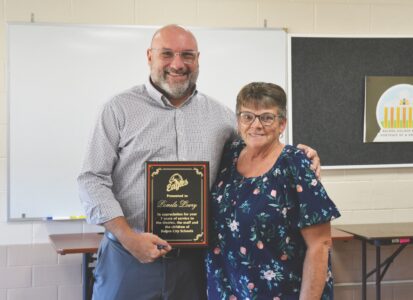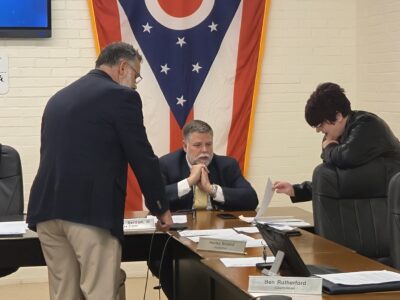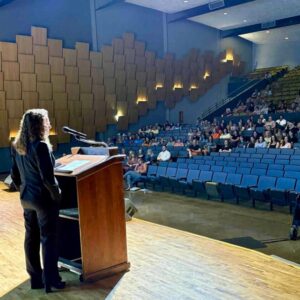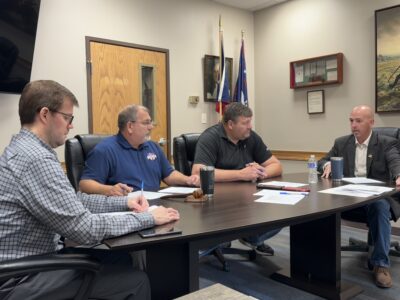Marietta City Council advances resolutions on potential injection well litigation
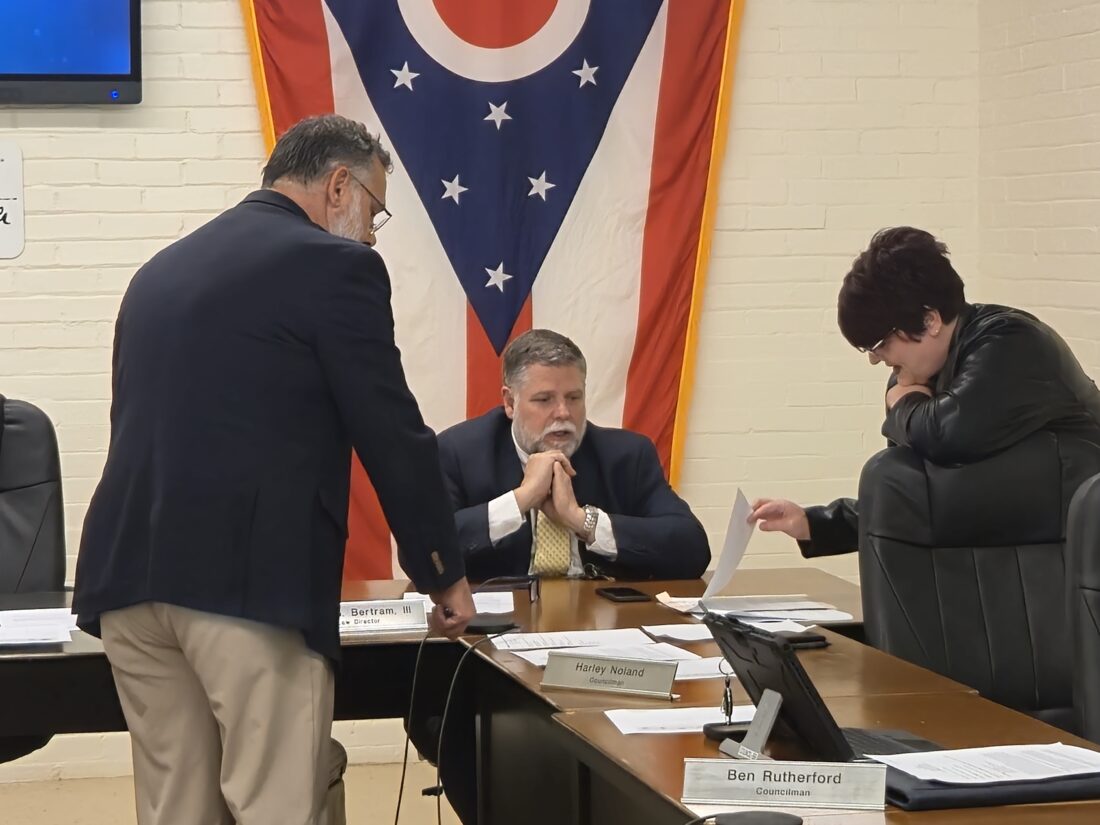
From left, Councilman Ben Rutherford, City Law Director Paul Bertram and Councilwoman Erin O’ Neill discuss legislation prior to the start of Thursday evening’s Marietta City Council meeting, where potential litigation over injection wells was discussed. (Photo by Gwen Sour)
Marietta City Council on Thursday advanced two measures related to a proposed Class II injection well while taking action on a slate of budget and policy items at a meeting that drew over 50 people and had nearly an hour of public comment centered on drinking-water protection.
Council gave first readings to Resolution 79, which would create an ad hoc Injection Well Task Force under the Water, Sewer & Sanitation Committee, and Resolution 80, which would authorize Law Director Paul Bertram to prosecute or defend litigation on the city’s behalf, including a potential challenge to the Ohio Department of Natural Resources’ Aug. 28 permit to DeepRock Disposal Solutions for the “Stephan No. 1” injection well.
According to the EPA, Class II wells are a type of underground injection well regulated under federal and state programs and are used exclusively in connection with oil and natural gas production. These wells are designed to dispose of fluids brought to the surface during drilling, the most common being brine, or salt water.
A bid to declare Resolution 79 an emergency and suspend second and third readings failed on a 4-3 vote, leaving the proposal to follow the normal process. Resolution 80 also received a first reading; sponsors said it will return for additional readings at future meetings.
Bertram told council the litigation authorization was rewritten to clarify his office’s authority and remove references to outside advocacy groups.
“In that ordinance, there is nothing about Earthjustice. There is nothing about Buckeye,” Bertram said, adding that the measure “authorizes and directs the law director to engage, if necessary, outside counsel and supporting experts” but leaves control of any case with his office.
Earthjustice is an environmental legal team that offered to represent the city for free, while Buckeye Environmental Network has offered information at local meetings about injection well concerns.
“Our own ordinance … indicates that I’m allowed and authorized to handle and do what I need to do to … defend (or) prosecute,” Bertram said.
Bertram framed the debate in terms of risk management and water safety.
“If somebody says that these things are ultimately 100% safe, I would like to remind you that airplanes fall out of the sky. Ships sink. Computers get hacked,” he said. “Human beings need water to survive … and if we don’t have clean water, we’ve got a problem. It’s better to be proactive than sit back on our hands.”
Council President Susan Vessels said the city submitted an objection and comment letter on Aug. 8, signed by nine elected officials, but ODNR issued a permit to drill on Aug. 28 “without the requested public hearing.” Vessels read into the record a Sept. 3 memo she wrote to the administration and council stating that ODNR’s combined response “uniformly denies all requests for public hearing” and “fails to address all of the issues raised in the city’s objection,” characterizing the agency’s posture as “we will do what we want … and you are not owed an explanation.”
Councilwoman Erin O’Neill, a co-sponsor of Resolution 80, said her focus is “protecting clean drinking water, farmland and public health.
“These are not partisan issues. They are basic responsibilities of local government,” O’Neill said. She added that potential legal action is “about ensuring that the state follows its own laws and applies the most protective standards on the books.”
O’Neill voted against fast-tracking Resolution 79, saying she wanted more public input and citing concerns “that this task force will be used as a method to stall or undermine council’s desire to move forward, and that this could become a panel stacked with technical voices favorable to the industry, while sidelining the broader community perspective.”
Councilman Bill Gossett said he supports pursuing every option to protect the city’s water well field.
“I work for the citizens of Marietta,” he said. “There is no amount of money that could ever repair the aquifer.”
Public comment ran more than an hour. Speakers included environmental professionals, township officials and residents urging council to challenge the permit and to strengthen local monitoring.
“If contamination is detected in these monitoring wells, how do we stop the contamination from contaminating the aquifer?” Marietta resident Dawn Hewitt said. “I would advocate a moratorium on injection wells in Washington County.”
Fourth ward resident and local pharmacist Kelly Kitchen shared her concerns regarding the injection wells.
“If a city’s water is gone, the city will be gone,” Kitchen said. “This community lives with C8 – the EPA allowed DuPont to continue what it was doing far after science indicated that those things were not cool.”
Marietta Water Superintendent Steve Eddy said the city is pursuing a Source Water Protection grant through the Ohio Environmental Protection Agency to install monitoring wells. He expects drilling to begin in January or February, with reimbursement anticipated after invoices and a grant application are submitted. Eddy said the city is working to identify specific indicators related to oil and gas waste and noted routine testing has shown non-detect for heavy metals in recent sampling.
In other business:
* Resolution 74, related to a records matter, and Resolution 75, establishing a formal policy for city gifts, were adopted unanimously.
* Ordinance 241, a multi-line appropriations measure, had its second and third readings suspended and was adopted unanimously after discussion about redistributing previously appropriated funds to clear smaller capital projects.
* Ordinance 242, appropriating $85,000 in the probation services fund, was advanced on an emergency basis and adopted, 6-1.
* Ordinance 238, seeking up to $1.2 million in additional design funding for the reverse-osmosis water treatment project via Ohio EPA/OWDA, received a second reading; Bertram said the city is exploring a larger financing package to match plant build-out needs.
* Ordinance 240, eliminating certain off-street parking minimums and updating parking-location rules, received a second reading. Allphin emphasized the change “doesn’t have anything to do with regulations around two-hour parking” and only removes stall-count minimums for new or expanding businesses.
* Resolutions 77 (Public Housing Agency Plan) and 78 (continuation of a Community Reinvestment Area agreement with Perry Associates) received second readings.
The next regular council meeting is scheduled for 7:30 p.m. Thursday, Oct. 2.

